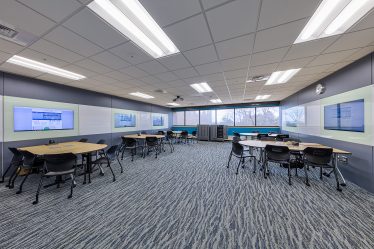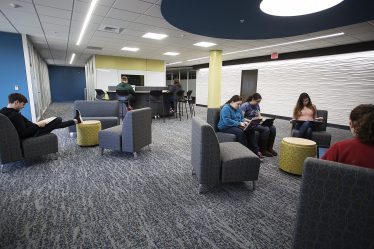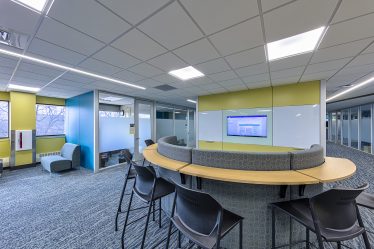Richland Community College works to assure the security and privacy of students, faculty, and staff. With the increased use of technology in all facets of College operations, Richland encourages all technology users to become familiar with relevant policies and procedures.
Responsible Use of Information Technology Policy (Board Policy 5.8.1)
In support of its mission and vision, Richland Community College provides access to information technology resources for students, faculty, and staff within institutional priorities and financial capabilities. The Policy for Responsible Use of Information Technology at Richland Community College shall be adhered to by all College units as well as all individuals who operate or use the information technology resources of the College. In addition, this policy applies to use of information technology resources that are entrusted to the institution by other organizations. In case of conflict, local, state, or federal laws supersede this policy.
Access to the College’s information technology facilities is a privilege, not a right, granted to College students, faculty, and staff. The College reserves the rights to extend, limit, restrict, or deny privileges and access to its information resources. Individuals other than College faculty, staff, and students may be permitted access to information technology in a manner consistent with the College’s mission and vision, policy, and guidelines.
Information technology provides important means of communication, both public and private. Users will respect the privacy of person-to-person communication in all forms including, but not limited to, voice (telephone), text (electronic mail, documents, and file transfer), image (graphics), and video (recorded and streaming). Authorized personnel are permitted to view and/or modify any electronic files, including electronic mail messages, as required by law, for any legitimate business reasons, or in the course of diagnosing and resolving system problems and maintaining information integrity.
College facilities and accounts are to be used for the activities or purposes for which they are assigned. College computing resources are not to be used for commercial purposes without written authorization from the College.
This policy provides general guidance and may be supplemented by additional regulations governing particular sub-systems of the College information technology resources. The Board charges the administration with the responsibility, and the Board delegates the administration the authority to develop appropriate guidelines, regulations, and procedures to implement the policy. The College makes no warranties of any kind, expressed or implied, for the technology services it is providing. The College will not be responsible for any actual or perceived damages suffered from the use of its information technology.
Violations of this policy shall be cause for discipline. Alleged violations of this policy shall be subject to the College’s disciplinary procedures. Illegal activities by users of the College technology including but not limited to illegal downloading and file sharing are prohibited.
In accordance with Illinois law, any depiction of child pornography discovered by members of the College’s information technology staff will be immediately reported to law enforcement authorities.
 NetID Password & User Account Privacy (Included in Class Syllabus)
NetID Password & User Account Privacy (Included in Class Syllabus)
Your Richland NetID password should not be shared with anyone. Providing your password or account access to anyone else will be considered a violation of the RCC Academic Integrity Policy (Board Policy 4.15.6) & the Responsible Use of Information Technology Policy (Board Policy 5.8.1)
NetID Password & User Account Privacy (Included in Class Syllabus)
To protect your account, you should always log off of College computers & online systems before exiting a classroom or public location.
Responsible Use of Classroom Content (Included in Class Syllabus)
Class discussions, papers, pictures, video, and any other work created for a course are all considered official course content. Work including papers, discussions, quizzes, assignments, etc., must be confined to the classroom (either on-campus or virtual) and should not be shared outside the classroom without the express permission of the person who created it. Students should respect the privacy of person-to-person or person-to-class communication in all forms. Violating others’ privacy may result in removal from the course. Significant or repeated violations may result in suspension or expulsion. This standard is pursuant to Board Policy 5.8.1 (Responsible Use of Information Technology) and the Code of Student Conduct.
Copyright Notice (Included in Class Syllabus)
The materials used in this course are protected by Copyright law. Faculty lectures, course supplementary materials, articles, quizzes and exams, papers, data, web pages, and artwork are among the properties protected. This is not an exhaustive list. Items may or may not be marked with a Copyright symbol ©. Regardless, the intellectual property used in this course is owned by the creator who is the sole determiner of how the property is used, including but not limited to copying, distribution, performance, display, or revisions.
 Richland Academic Integrity Policy (Board Policy 4.15.6)
Richland Academic Integrity Policy (Board Policy 4.15.6)
All students are expected to maintain academic integrity in their academic work and honesty in all dealings with the College. A student who cheats, plagiarizes, or furnishes false, misleading information to the College is subject to disciplinary action up to and including failure of a class or suspension/expulsion from the College.

